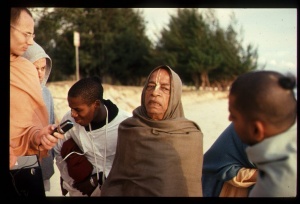SB 9.23.30-31: Difference between revisions
No edit summary |
(Vanibot #0054 edit - transform synonyms into clickable links, which search similar occurrences) |
||
| Line 30: | Line 30: | ||
<div class="synonyms"> | <div class="synonyms"> | ||
''mādhavāḥ'' | ''[//vanipedia.org/wiki/Special:VaniSearch?s=mādhavāḥ&tab=syno_o&ds=1 mādhavāḥ]'' — the dynasty beginning from Madhu; ''[//vanipedia.org/wiki/Special:VaniSearch?s=vṛṣṇayaḥ&tab=syno_o&ds=1 vṛṣṇayaḥ]'' — the dynasty beginning from Vṛṣṇi; ''[//vanipedia.org/wiki/Special:VaniSearch?s=rājan&tab=syno_o&ds=1 rājan]'' — O King (Mahārāja Parīkṣit); ''[//vanipedia.org/wiki/Special:VaniSearch?s=yādavāḥ&tab=syno_o&ds=1 yādavāḥ]'' — the dynasty beginning from Yadu; ''[//vanipedia.org/wiki/Special:VaniSearch?s=ca&tab=syno_o&ds=1 ca]'' — and; ''[//vanipedia.org/wiki/Special:VaniSearch?s=iti&tab=syno_o&ds=1 iti]'' — thus; ''[//vanipedia.org/wiki/Special:VaniSearch?s=saṁjñitāḥ&tab=syno_o&ds=1 saṁjñitāḥ]'' — are so-called because of those different persons; ''[//vanipedia.org/wiki/Special:VaniSearch?s=yadu&tab=syno_o&ds=1 yadu]-[//vanipedia.org/wiki/Special:VaniSearch?s=putrasya&tab=syno_o&ds=1 putrasya]'' — of the son of Yadu; ''[//vanipedia.org/wiki/Special:VaniSearch?s=ca&tab=syno_o&ds=1 ca]'' — also; ''[//vanipedia.org/wiki/Special:VaniSearch?s=kroṣṭoḥ&tab=syno_o&ds=1 kroṣṭoḥ]'' — of Kroṣṭā; ''[//vanipedia.org/wiki/Special:VaniSearch?s=putraḥ&tab=syno_o&ds=1 putraḥ]'' — the son; ''[//vanipedia.org/wiki/Special:VaniSearch?s=vṛjinavān&tab=syno_o&ds=1 vṛjinavān]'' — his name was Vṛjinavān; ''[//vanipedia.org/wiki/Special:VaniSearch?s=tataḥ&tab=syno_o&ds=1 tataḥ]'' — from him (Vṛjinavān); ''[//vanipedia.org/wiki/Special:VaniSearch?s=svāhitaḥ&tab=syno_o&ds=1 svāhitaḥ]'' — Svāhita; ''[//vanipedia.org/wiki/Special:VaniSearch?s=ataḥ&tab=syno_o&ds=1 ataḥ]'' — thereafter; ''[//vanipedia.org/wiki/Special:VaniSearch?s=viṣadguḥ&tab=syno_o&ds=1 viṣadguḥ]'' — a son named Viṣadgu; ''[//vanipedia.org/wiki/Special:VaniSearch?s=vai&tab=syno_o&ds=1 vai]'' — indeed; ''[//vanipedia.org/wiki/Special:VaniSearch?s=tasya&tab=syno_o&ds=1 tasya]'' — of him; ''[//vanipedia.org/wiki/Special:VaniSearch?s=citrarathaḥ&tab=syno_o&ds=1 citrarathaḥ]'' — Citraratha; ''[//vanipedia.org/wiki/Special:VaniSearch?s=tataḥ&tab=syno_o&ds=1 tataḥ]'' — from him; ''[//vanipedia.org/wiki/Special:VaniSearch?s=śaśabinduḥ&tab=syno_o&ds=1 śaśabinduḥ]'' — Śaśabindu; ''[//vanipedia.org/wiki/Special:VaniSearch?s=mahā&tab=syno_o&ds=1 mahā]-[//vanipedia.org/wiki/Special:VaniSearch?s=yogī&tab=syno_o&ds=1 yogī]'' — a great mystic; ''[//vanipedia.org/wiki/Special:VaniSearch?s=mahā&tab=syno_o&ds=1 mahā]-[//vanipedia.org/wiki/Special:VaniSearch?s=bhāgaḥ&tab=syno_o&ds=1 bhāgaḥ]'' — most fortunate; ''[//vanipedia.org/wiki/Special:VaniSearch?s=mahān&tab=syno_o&ds=1 mahān]'' — a great personality; ''[//vanipedia.org/wiki/Special:VaniSearch?s=abhūt&tab=syno_o&ds=1 abhūt]'' — he became; ''[//vanipedia.org/wiki/Special:VaniSearch?s=caturdaśa&tab=syno_o&ds=1 caturdaśa]-[//vanipedia.org/wiki/Special:VaniSearch?s=mahāratnaḥ&tab=syno_o&ds=1 mahāratnaḥ]'' — fourteen kinds of great opulences; ''[//vanipedia.org/wiki/Special:VaniSearch?s=cakravartī&tab=syno_o&ds=1 cakravartī]'' — he possessed as the emperor; ''[//vanipedia.org/wiki/Special:VaniSearch?s=aparājitaḥ&tab=syno_o&ds=1 aparājitaḥ]'' — not defeated by anyone else. | ||
</div> | </div> | ||
Latest revision as of 23:54, 18 February 2024

A.C. Bhaktivedanta Swami Prabhupada
TEXTS 30-31
- mādhavā vṛṣṇayo rājan
- yādavāś ceti saṁjñitāḥ
- yadu-putrasya ca kroṣṭoḥ
- putro vṛjinavāṁs tataḥ
- svāhito 'to viṣadgur vai
- tasya citrarathas tataḥ
- śaśabindur mahā-yogī
- mahā-bhāgo mahān abhūt
- caturdaśa-mahāratnaś
- cakravarty aparājitaḥ
SYNONYMS
mādhavāḥ — the dynasty beginning from Madhu; vṛṣṇayaḥ — the dynasty beginning from Vṛṣṇi; rājan — O King (Mahārāja Parīkṣit); yādavāḥ — the dynasty beginning from Yadu; ca — and; iti — thus; saṁjñitāḥ — are so-called because of those different persons; yadu-putrasya — of the son of Yadu; ca — also; kroṣṭoḥ — of Kroṣṭā; putraḥ — the son; vṛjinavān — his name was Vṛjinavān; tataḥ — from him (Vṛjinavān); svāhitaḥ — Svāhita; ataḥ — thereafter; viṣadguḥ — a son named Viṣadgu; vai — indeed; tasya — of him; citrarathaḥ — Citraratha; tataḥ — from him; śaśabinduḥ — Śaśabindu; mahā-yogī — a great mystic; mahā-bhāgaḥ — most fortunate; mahān — a great personality; abhūt — he became; caturdaśa-mahāratnaḥ — fourteen kinds of great opulences; cakravartī — he possessed as the emperor; aparājitaḥ — not defeated by anyone else.
TRANSLATION
O Mahārāja Parīkṣit, because Yadu, Madhu and Vṛṣṇi each inaugurated a dynasty, their dynasties are known as Yādava, Mādhava and Vṛṣṇi. The son of Yadu named Kroṣṭā had a son named Vṛjinavān. The son of Vṛjinavān was Svāhita; the son of Svāhita, Viṣadgu; the son of Viṣadgu, Citraratha; and the son of Citraratha, Śaśabindu. The greatly fortunate Śaśabindu, who was a great mystic, possessed fourteen opulences and was the owner of fourteen great jewels. Thus he became the emperor of the world.
PURPORT
In the Mārkaṇḍeya Purāṇa the fourteen kinds of great jewels are described as follows: (1) an elephant, (2) a horse, (3) a chariot, (4) a wife, (5) arrows, (6) a reservoir of wealth, (7) a garland, (8) valuable costumes, (9) trees, (10) a spear, (11) a noose, (12) jewels, (13) an umbrella, and (14) regulative principles. To be the emperor, one must possess all fourteen of these opulences. Śaśabindu possessed them all.